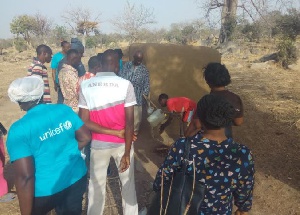The cholera outbreak, and other epidemics associated with trash are expected to fall drastically in recurrence rate in the Upper East region as 385 communities in the area have put an end to responding in public when nature calls.
The region had been unanimously crowned the ‘stronghold of open defecation’ in the country, with some proud offenders even taking selfies as they squat unhidden to expel waste, until the United Nations Children’s Fund (UNICEF) in conjunction with Ghana’s Ministry of Local Government and Rural Development launched a ‘far-reaching raid’ to ‘exorcise’ the endemic practice from the region.
The intervention— dubbed Community-Led Total Sanitation (CTLS) — has, since its nervous takeoff in 2010 and a cool scale-up in 2012, seen thousands of homes ‘delivered’ from the ‘iron grips’ of ‘free range’ through a community-wide sensitisation exercise that led to households taking enlightened steps to erect their own latrines.
The latest area to join the region’s free-range-free communities in 2018 is Ayiwia, a naturally gorgeous suburb of the Bongo District where towering clusters of rocks, which ought to have been attracting tourists to the poor village with their breathtaking forms, rather had been attracting houseflies as they were being used everywhere as toilets.
The area was certified and declared “free from free range” after a team of sanitation experts had conducted an in-depth inspection tour of the community in the second week of February. UNICEF’s Country Representative, Anne-Claire Dufay, who observed the inspection together with some government officials, was loud in her tribute to the residents for welcoming the reform.
“We’re very glad as UNICEF to congratulate you for this certification today, being open-defecation-free. As you know, UNICEF— we work very closely with the Government of Ghana to promote open-defecation-free communities. You know that your President is also very committed in relation to open-defecation-free Ghana. And, so, we will continue to contribute in this important endeavour,” she remarked at a durbar.
The Tough Test
Prior to the declaration that Ayiwia had become free from open defecation, many members of the community, including children and elderly folks, looked as very anxious at the durbar ground as a doubtful student awaiting the results of a tough examination.
The community needed to obtain at least an 85% mark to attain an open-defecation-free status. If they failed, jeers from their neighbours, aside from being disappointed in themselves, also were inevitable. And in a part of the country where hosts generally would not want to let their guests down, there was also an overwhelming amount of pressure on the community to be in the good books of the visiting UNICEF and government representatives and to earn a treasure at stake— a certificate.
The pressure became even more intense, and exciting, when it was announced at the ground that the function was being aired live on Word FM, one of the most tuned radio stations in the regional capital. It was like a live telecast of a high-risk surgery endorsed by all relevant risk-takers involved.
Sanitation experts, joined by the UNICEF and government contingent, took a break in the middle of the durbar and walked in groups as they inspected houses, bushes and rocky areas in the community in what they termed as a verification process. They had some simple but decisive questions mainly targeted at children— the ‘chief culprits’ in every free-range community.
One of such questions to ask any child met on the way was to find out where they often answered to the call of nature and, if the child pointed at a latrine in reply, also to demonstrate or explain how it was used. Some hearts beat rapidly and many swallowed saliva of despair among the elders of the community as experts engaged children at random on the way. It was an interesting spectacle for observers.
When the inspectors returned to the durbar ground after the tour, they did not calculate the marks alone. They had unsolicited assistance from anxious members of the community, among them old women, who enthusiastically employed old Arithmetic methods to help arrive at subtotals. Some men stared with fear at the inspection team as points were being called out from a score sheet.
Some foresaw a good finish after the leader of team, Juventius Awinsone Asayuure, in a pre-announcement statement, said the children questioned gave positive answers, that not a single piece of paper was found on the ground and that there was no trace of human waste anywhere during the verification walk as every house now had not just a latrine in use but a decent one. A shout of jubilation, only compared to cheers of freedom from colonial rule, erupted when the final result was declared and it turned out to be 100%!
The Beauty Everyone is Talking About
The durbar took place at a clean grassy lowland when the sun was about to set. Leafy branches of the surrounding trees provided for the gathering a natural canopy which blended beautifully with the rainbow effects created by the penetrating rays of the setting sun.
The rocks, which for centuries were used as latrines, stood in their numbers around the sparsely treed venue, all looking spotless and relieved of their waste burdens. An unpolluted natural air, usually not found in the too-busy urban parts of the region, blew in abundance as an orchestra of guest-shy guinea fowls, heading home from a feeding tour whilst the durbar was underway, made loud musical calls which first-time visitors to the village found very harmonious with the whisper of the Savannah winds.
Every courtyard in the serene surroundings looked orderly. Dry stalks bundled in front mud huts, the predominant structures in that rural setting, were a delight to watch as they mirrored a heartwarming fruitfulness of the peaceful-looking settlement. Ayiwia, adorned with an irresistible beauty, looks more like a healthy, perfect ‘bride’ after parting company with the old practice of open defecation.
The Upper East Regional Chief Director, Alhaji Mahamadu A. Azonko, who represented the Upper East Regional Minister, Rockson Bukari, at the function, bared his secret love for the hamlet.
“Even if somebody gets to this community and gets stranded, he doesn’t even need a home to sleep in; he can even sleep in the toilets. I wish I could exchange this community with what I have as a traditional leader. I hope to bring my family here one day to come and breathe natural air,” he said with emphasis as a crowd clapped thunderously.
A joy-filled District Chief Executive for Bongo, Peter Ayamga Ayimbisa, climaxed the occasion by announcing assembly’s plans to honour the first electoral area in the district to be declared free-range-free in the future with an award.
Regional News of Wednesday, 21 February 2018
Source: starrfmonline.com

















